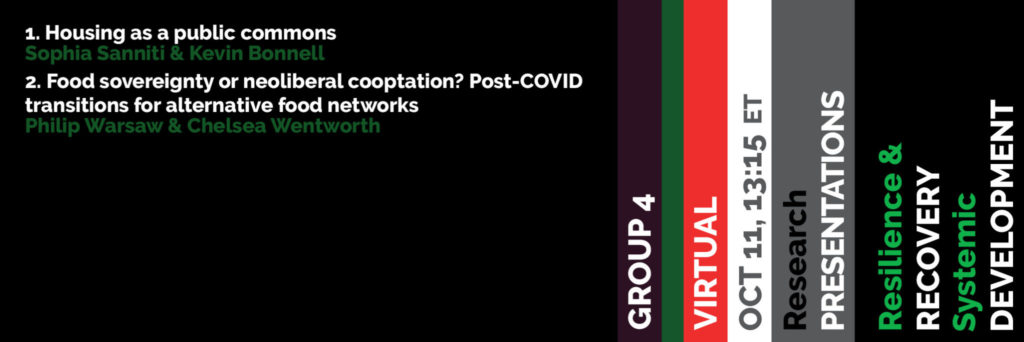
Housing as a Public Commons.
Sophia Sanniti & Kevin Bonnell
In the first issue of the Ecological Economics journal, Ehrlich (1989) observed that the etymological origins of both economics and ecology come from notions of housekeeping. It is thus a relevant academic pursuit in the ecological economics discipline to examine the labours of keeping house, including the kinds of work, divisions of responsibility, and how such interactions at the household level shape the political and economic realities of the present growth paradigm. Feminist economists have long examined this research area, demonstrating the pivotal role that the unpaid labour of women within the household play in essentially subsidizing the economy by creating and maintaining a willing and healthy workforce.
Paralleling the critiques of ecological economics, feminist economists have investigated the way the domestic sector has historically been subordinated, marginalized, and exploited by capitalism. It is critical research imperative to combine such investigations to understand more holistically how the commodification of reproductive labours (ecological and social) has served to entrench neoliberal ideologies, politics, and subjectivities. Capitalism requires the ongoing enclosure of the shared commons (land, waters, air, resources, people) for the ongoing process of accumulation via dispossession. As such, the radically alternative economic politics investigated by ecological economists can only be effective when the commons are re-established.
This research intervention examines the notion of the household as a form of public commons. Following the model proposed by Gibson-Graham, Cameron, and Healy (2013) in their book “Take Back the Economy”, the authors identify four main types of commons: biophysical (sunlight, air), cultural (language, art), social (ethics, relationships) and knowledge commons (skills, ecological awareness). This presentation will demonstrate the significance and possibilities presented by recognizing the domestic sector as a form of public commons to activate citizen engagement, reclaim of spaces and labours, and revolutionize the present growth-based economy.
Food Sovereignty or Neoliberal Cooptation? Post-COVID Transitions for Alternative Food Networks.
Phillip Warsaw & Chelsea Wentworth
Many of us remember the breakdowns in global agricultural supply chains that occurred during the peak of the COVID-19 pandemic. Empty store shelves contrasted with farmers disposing of tons of produce on their fields were commonplace on the news. During this time, many households turned to local alternatives, such as farmers markets, CSAs, and other impromptu food marketplaces, creating a surge in demand for small and mid-sized producers. This also caused many scholars and activists to question whether these alternative food networks were positioned to present a challenge to the current corporate food regime (CFR), in favour of an alternative which centred equity and food sovereignty. In this presentation, I will discuss the successes and challenges that actors within these localized food networks faced prior to and during the COVID-19 pandemic, their visions for a sustainable food system in the aftermath of the worst of the pandemic, and the implications for food justice, food sovereignty, and the organizations supporting these movements. To address these questions, I will present the results of a mixed methods study of farmers markets in Michigan and Wisconsin from 2020-2021, characterizing the resilience of farmers markets as an institution to the economic and public health shocks caused by COVID-19, how the pandemic changed the relationship and goals that market managers, vendors, and customers have with and for the market, and the possibilities of farmers markets serving as part of a viable alternative to the CFR. I find that while markets were resilient to the pandemic, protecting farmer viability and providing a steady source of food to local communities, and that shifting customer values may provide the basis for broader questioning of the CFR the continued emphasis on economic efficiency undermines the radical potential for farmers markets in the present.
